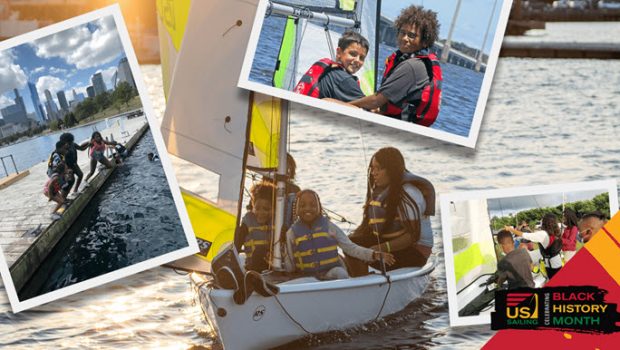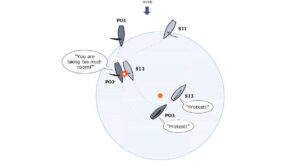Inclusion is more than just a word
Published on February 18th, 2022
February is Black History Month in the United States, and in this report by US Sailing, they review the pathway toward inclusion:
According to the American Psychological Association, participation in sport can provide benefits to underrepresented communities, “but only within an intentionally created environment.”
That’s exactly what the Siebel Sailors Program aims to do. Launched in 2019 with a partnership between US Sailing and the Thomas and Stacey Siebel Foundation, the programs and organizations work to improve the quality of life, environment, and education of its community members.
“In order to get more Black students involved, we at white-led organizations need to check ourselves to see if we’re reaching out in meaningful ways and offering experiences that feel relevant,” said Blair Overman, Siebel Programs Manager.
“We can’t just open our doors and expect them to come; we actually have to do the work to make them feel welcomed, included, and that the spaces we’ve created have their best interests at heart.”
Unlike some one-and-done experiences that give diverse youth a taste of sailing, the Siebel Sailors Program aims to go deeper. Rather than just opening doors and getting kids in boats, the program is focused on addressing the more subtle social and emotional obstacles Black students face when entering the sport of sailing.
According to Overman, who completed a Master of International Development focused on Poverty Alleviation and has spent most of her adult life working with under-served youth, other concerns like transportation, representation at the host organization, and water comfort factor into minority participation and retention in sailing.
“At Siebel, we are always considering these other factors when we design our programs and mentor Center staff,” said Overman. “It’s not enough for our Siebel Sailors to show up for one season and never come back again. We want them to sail for life and make our sport better and sustainable.”
To that effort, in the last year Siebel doubled BIPOC (Black, Indigenous, and people of color) participation in three of their regions by supporting students with scholarships, inclusive coaching, and provided equipment.
The program mandates that 50% of students accepted to each Siebel Center are from under-represented populations and are on scholarship. Each center is required to look at the demographics in their area and have their student makeup reflect it.
Overman also emphasized the mentoring that Siebel Center instructors receive before their centers even begin accepting students.
Instructors go through a 12-hour onboarding process before being endorsed to run a Siebel youth program: six hours in the classroom, covering best practices, case studies, and lessons on language; and six hours in the field, shadowed by a US Sailing Siebel Coach who gives feedback on how instructors can self-assess and create a more welcoming environment through their behavior.
In another effort to get all members of the community involved, each Siebel Center is encouraged to reach out and invite families of prospective students to learn exactly what their child will be doing as a Siebel Sailor.
“The coaches walk through all elements of the program, like the swim check, boat activities, what gear is provided and safety protocols,” said Overman. “We want the family to know what their children will be doing so they can be fully engaged and trust that they are in good hands.”
Tom Siebel, a lifelong sailor who began sailing at age eight and has competed on everything from catamarans to J Class yachts, saw enormous potential in the community sailing realm. He saw a need to offer a more profound connection to kids to keep them engaged and wanted to create something new and transformative – thus, the Siebel Sailors Program was born.
Since then, over 1,000 youth sailors have participated in the program, many of whom are still involved in sailing even after they have left or aged out of the Siebel program itself.
For example, Krista, a 12-year-old student from the Mid-Atlantic Region, struggled with water comfort and was initially hesitant to even step foot on the boat at the dock. It was only after having her concerns heard that she felt comfortable trying out crewing and skippering. Her Assistant Siebel Coach was a big part of that.
Thanks to that support, Krista signed up for eight weeks of sailing summer camp. Although she has aged out of Siebel, she now races on the high school sailing team hosted by the same Siebel Partner Center, DC Sail, that recruited her to Siebel.
The Siebel Program keeps class sizes small so that students get all the individual attention that they need. Daily check-ins are a part of program delivery, as is the opportunity for students to give feedback to their Coaches during the debrief about what they liked, disliked, want to remove, and want to try. Student voice is at the heart of all program decisions; Coaches only push as hard as a student wants to go, according to Overman.
As for the 19 centers involved with Siebel, they have witnessed firsthand the benefit the program brings – to the staff and the students served.
Centers that are accepted into the program are fully equipped by Siebel, not only with staff mentorship and US Sailing Siebel curriculum, but with boats, lifejackets, and other sailing gear they may need to support students who may not have access. This equipment is an investment in the centers themselves – even after their involvement with the Siebel Program ends, the centers keep the boats and other equipment endowed by the program.
“We’re really trying to train the centers to create a program that will last beyond our initial involvement,” said Overman. “We want the impact Siebel has on kids to last for generations.”
Nino Johnson, former Sailing Director of Sail Sand Point, a Siebel Center in Seattle, WA didn’t hold back on his assessment of the Siebel Sailors Program: “I think the Siebel program is the most meaningful work that US Sailing has ever done.”
But the Siebel staff and coaches are not about to sit on their laurels just yet. “There is plenty of work left to do and we’re just getting started,” said Overman.
To help expand the program, The Tom and Stacey Siebel Foundation have pledged to match all gifts to the Siebel Sailors Program in 2022 up to $5 million. Each donation will have its impact doubled. Click here to donate or contact Jill Nosach at jillnosach@ussailingfoundation.org.
To keep up with the expansion, the program is also hiring coaches for the Midwest and Northern California regions. Apply here: https://www.ussailing.org/about/our-people/careers/









 We’ll keep your information safe.
We’ll keep your information safe.